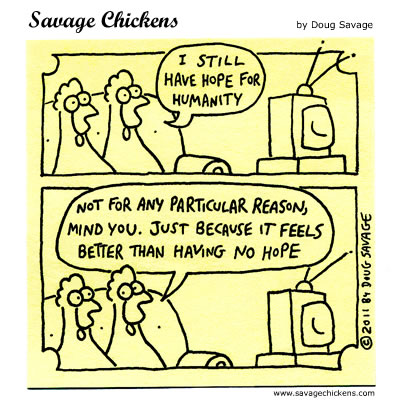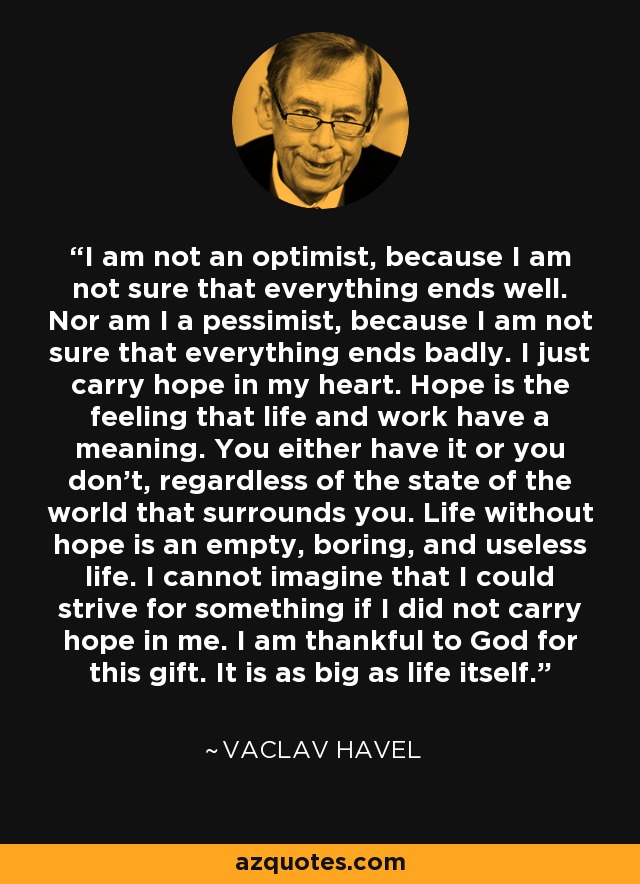![]() Hope [optimism, future-mindedness, future orientation]: Expecting the best in the future and working to achieve it; believing that a good future is something that can be brought about. Personified for example by Martin Luther King, Jr (Source: VIA Institute)
Hope [optimism, future-mindedness, future orientation]: Expecting the best in the future and working to achieve it; believing that a good future is something that can be brought about. Personified for example by Martin Luther King, Jr (Source: VIA Institute)

The Noel Strengths Academy defines it this way:
- Optimistic about life’s realities
- Takes personal ownership of the good and sees it as perpetually possible
- Sees the bad as transient and short-term
- Enthusiastic about the future
- Eager to contribute to a better tomorrow
- Willing to make plans and set goals

- Underuse: Negativism
- Overuse: Pollyana-ism
Key Research:
- Rank order of Hope/Optimism in populations from:
- US : 10;
- European: 16
- Asia: 9
- Latin America: 10
- Sub-Saharan Africa: 9
- Middle east: 14
- In addition to replication of the connection between hope, gratitude, love, zest, and curiosity with life satisfaction, the strengths that were the best predictors of future life satisfaction were hope and spirituality (Proyer et al., 2011).
- Among youth, the character strengths most related to life satisfaction are love, gratitude, hope, and zest; very young children (ages 3-9) described by their parents as happy are also noted as showing love, hope, and zest (Park & Peterson, 2009b).
- The character strengths most associated with the meaning route to happiness are religiousness, gratitude, hope, zest, and curiosity (Peterson et al., 2007).
- The character strengths most associated with the engagement route to happiness are zest, curiosity, hope, perseverance, and perspective (Peterson et al., 2007).
- The character strengths most associated with the pleasure route to happiness are humor, zest, hope, social intelligence, and love (Peterson et al., 2007).
Tayyab Rashid and Afroze Anjum offer 340 Ways to Use VIA Character Strengths including these four for Hope/Optomism:
- List all the bad things that happened to you in the previous day. Then find at least two positive aspects for each.
- Visualize where and what you want to be after one, five and ten years. Sketch a pathway that you can follow to get there. Include manageable steps and ways to chart your progress.
- Record your negative and positive thought patterns and notice how they affect your future performance. Experiment with making your thoughts more positive and see if your performance improves.
- Read about someone who succeeded despite difficulties and setbacks. Look for similar obstacles that both of you faced.
Psychological Impacts of Hope/Optimism
- Hope is linked to increased resilience: Research has shown that individuals who possess hope tend to be more resilient and better able to cope with adversity (Snyder et al., 1991).
- Hope is associated with increased positive emotions: Studies have found that individuals who practice hope tend to experience increased positive emotions such as joy, gratitude, and contentment (Seligman et al., 2005).
- Hope is linked to reduced depression: Research has shown that hope is negatively correlated with depression, as it provides individuals with a sense of purpose and direction (Kashdan & Ciarrochi, 2013).
- Hope is a key component of emotional intelligence: Hope is considered a key component of emotional intelligence, as it involves recognizing and managing one’s emotions, particularly positive emotions such as optimism and enthusiasm (Goleman, 1995).
- Hope is developed through social learning: Hope is developed through social learning, particularly through observing and imitating others who exhibit hopeful behavior (Bandura, 1977).
- Hope is linked to increased self-esteem: Research has shown that individuals who practice hope tend to have higher self-esteem and a more positive self-image (Tangney et al., 2007).
- Hope is a key factor in personal growth: Hope is critical for personal growth, as it allows individuals to set goals and work towards achieving them (Toussaint et al., 2015).
- Hope is associated with increased creativity: Studies have found that individuals who practice hope tend to be more creative and innovative, as they are more likely to take risks and explore new ideas (Amabile, 1988).
- Hope is linked to reduced anxiety: Research has shown that hope is negatively correlated with anxiety, as it provides individuals with a sense of control and direction (Kashdan & Ciarrochi, 2013).
- Hope is a key component of moral character: Hope is considered a key component of moral character, along with other character strengths such as compassion, fairness, and responsibility (VIA Institute, 2015).
- Learned Optimism: How to Change Your Mind and Your Life by Martin E. P. Seligman
- Mindset: The New Psychology of Success by Carol S. Dweck
- Hope and Other Superpowers: A Life-Affirming, Love-Defending, Butt-Kicking, World-Saving Manifesto by John Pavlovitz
- Making Hope Happen: Create the Future You Want for Yourself and Others
by Shane J. Lopez Ph.D. Written by a leading researcher on hope, this book provides practical strategies for cultivating hope and using it to achieve personal and professional goals.
- “The Anatomy of Hope: How People Prevail in the Face of Illness” by Jerome Groopman This book explores the role of hope in the context of medical conditions and how it can contribute to resilience and better outcomes.”Hope in the Age of Anxiety” by Anthony Scioli and Henry Biller This book examines the concept of hope from a psychological perspective and offers strategies for developing and sustaining hope in the face of challenges and adversity.
- “The Hope Circuit: A Psychologist’s Journey from Helplessness to Optimism” by Martin E.P. Seligman Written by a renowned psychologist, this book discusses the concept of learned helplessness and how developing a hopeful mindset can lead to greater well-being and personal growth.
- “The Power of Hope: Human Resilience and the Power of Hope” by Viktor E. Frankl: This book explores the psychological and philosophical aspects of hope, particularly in the context of adversity and suffering. It discusses how hope can be a powerful force in overcoming challenges and finding meaning in life[Not included in the search results].
-
We’ve known about global warming for 50 years and done little about it, says Google.org director Larry Brilliant. In spite of this and other depressing trends, he’s optimistic and tells us why. From Skoll World Forum, Oxford, UK, www.skollfoundation.org
Are we born to be optimistic, rather than realistic? Tali Sharot shares new research that suggests our brains are wired to look on the bright side — and how that can be both dangerous and beneficial.
Resources
- Learned optimism self-assessment
- Article on learned optimism

Podcasts to feed your Hope/Optimism
- Unhooked podcast: True stories and lessons learned from those still standing through adversity and fiery trials. Hosted by Recovery Writer Annie Highwater, Author of books “Unhooked”, and “Unbroken.” Created for sharing the lives of those who have struggled with (or have been adjacent to), addiction, alcoholism, codependency, crisis and chaos. Names, and minor details have been changed to preserve anonymity, but the experiences are real, raw and true. The purpose of this podcast is to let you know you’re NOT …
- Never, ever give up hope: Do you want to succeed? Need to be inspired? Want to be a victor instead of a victim? Are you looking for coping mechanisms? This show shares stories of everyday people who refused to give up hope in the middle of insurmountable circumstances; people who have transformed their lives and want to give you their secrets of success. Their message is one of hope, encouragement, laughter and inspiration. No subject is off limits, i.e. abuse, failure, health issues, depression, coping with stress.
- I Share Hope is a series of interviews with world leaders discussing their beliefs and experiences with hope and how they use hope on a daily basis in their own life and in the lives of others. They discuss real stories from their past and cover such topics as experience, relationships, failure, success, coping, depression, suicide, acceptance, business, psychological issues, illness, inspirational and motivational ideas, life, vision, goal setting, love, family, friends, strength, action steps, actionable hope, discrimination, education, freedom, leadership, counseling, dependency, addiction, chemical addiction, abuse and much more. Just about every area in life. The show airs three days a week via podcast.
- Tara Brach: How Hope can Heal and Free Us – Part I and part 2
- Tara Brach: Hope and the Spiritual Path — Part 1 and Part 2
- “The Science of Hope” – Oprah’s SuperSoul Conversations Summary: Oprah talks with researchers about the psychology and benefits of hope. URL: https://podcasts.apple.com/us/podcast/the-science-of-hope/id1264973438?i=1000422335484
- “The Power of Optimism” – The Psychology Podcast Summary: This episode looks at optimism’s impacts on achievement, health and well-being. URL: https://scottbarrykaufman.com/podcast/the-power-of-optimism/
- “Staying Optimistic in Hard Times” – The Science of Happiness (UC Berkeley) Summary: Evidence-based strategies for cultivating a hopeful mindset amid adversity. URL: https://ggsc.berkeley.edu/podcasts/story/staying_optimistic_in_hard_times
- “Rational Optimism” – The Knowledge Project with Shane Parrish Summary: Parrish explores how to balance pragmatic optimism with clear-eyed realism. URL: https://fs.blog/knowledge-project/rational-optimism/
- “A Case for Rational Optimism” – WorkLife with Adam Grant Summary: Grant makes the evidence-based argument for sustaining rational hope.
URL: https://www.ted.com/podcasts/worklife/a-case-for-rational-optimism
 Meditation for Hope/Optimism
Meditation for Hope/Optimism
- Shower of Hope @ Insight Timer
- Kindness to Self Using the Breath @ Insight Timer
- Loving Kindness with Meg Levie @ SIYLI
- Loving-Kindness Meditation @ Greater Good
- A Loving-Kindness Meditation to Boost Compassion @ Mindful
Read more on meditation and Hope:
- 12 Reasons To Combine Mindfulness and Character Strength
- How Meditation Powers Positive Thinking & Boosts Happiness – EOC
- 18 Science-Based Reasons to Try Loving-Kindness Meditation Today!
‘I just carry hope in my heart. Hope is not a feeling of certainty, that all ends well. Hope is just a feeling that life and work have meaning.’ –Vaclav Havel





